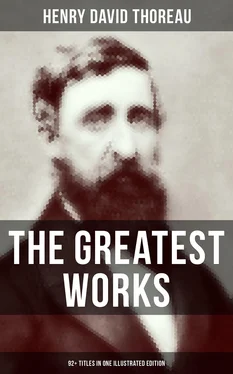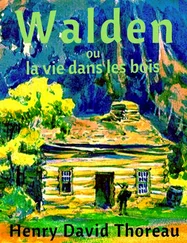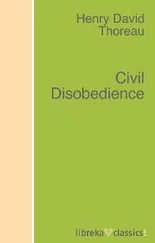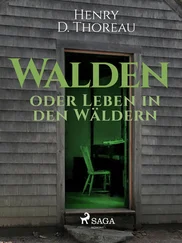"How many thousands never heard the name
Of Sidney, or of Spenser, or their books?
And yet brave fellows, and presume of fame,
And seem to bear down all the world with looks."
The ready writer seizes the pen, and shouts, Forward! Alamo and Fanning! and after rolls the tide of war. The very walls and fences seem to travel. But the most rapid trot is no flow after all; and thither, reader, you and I, at least, will not follow.
A perfectly healthy sentence, it is true, is extremely rare. For the most part we miss the hue and fragrance of the thought; as if we could be satisfied with the dews of the morning or evening without their colors, or the heavens without their azure. The most attractive sentences are, perhaps, not the wisest, but the surest and roundest. They are spoken firmly and conclusively, as if the speaker had a right to know what he says, and if not wise, they have at least been well learned. Sir Walter Raleigh might well be studied if only for the excellence of his style, for he is remarkable in the midst of so many masters. There is a natural emphasis in his style, like a man's tread, and a breathing space between the sentences, which the best of modern writing does not furnish. His chapters are like English parks, or say rather like a Western forest, where the larger growth keeps down the underwood, and one may ride on horseback through the openings. All the distinguished writers of that period possess a greater vigor and naturalness than the more modern,—for it is allowed to slander our own time,—and when we read a quotation from one of them in the midst of a modern author, we seem to have come suddenly upon a greener ground, a greater depth and strength of soil. It is as if a green bough were laid across the page, and we are refreshed as by the sight of fresh grass in midwinter or early spring. You have constantly the warrant of life and experience in what you read. The little that is said is eked out by implication of the much that was done. The sentences are verdurous and blooming as evergreen and flowers, because they are rooted in fact and experience, but our false and florid sentence have only the tints of flowers without their sap or roots. All men are really most attracted by the beauty of plain speech, and they even write in a florid style in imitation of this. They prefer to be misunderstood rather than to come short of its exuberance. Hussein Effendi praised the epistolary style of Ibrahim Pasha to the French traveller Botta, because of "the difficulty of understanding it; there was," he said, "but one person at Jidda, who was capable of understanding and explaining the Pasha's correspondence." A man's whole life is taxed for the least thing well done. It is its net result. Every sentence is the result of a long probation. Where shall we look for standard English, but to the words of a standard man? The word which is best said came nearest to not being spoken at all, for it is cousin to a deed which the speaker could have better done. Nay, almost it must have taken the place of a deed by some urgent necessity, even by some misfortune, so that the truest writer will be some captive knight, after all. And perhaps the fates had such a design, when, having stored Raleigh so richly with the substance of life and experience, they made him a fast prisoner, and compelled him to make his words his deeds, and transfer to his expression the emphasis and sincerity of his action.
Men have a respect for scholarship and learning greatly out of proportion to the use they commonly serve. We are amused to read how Ben Jonson engaged, that the dull masks with which the royal family and nobility were to be entertained should be "grounded upon antiquity and solid learning." Can there be any greater reproach than an idle learning? Learn to split wood, at least. The necessity of labor and conversation with many men and things, to the scholar is rarely well remembered; steady labor with the hands, which engrosses the attention also, is unquestionably the best method of removing palaver and sentimentality out of one's style, both of speaking and writing. If he has worked hard from morning till night, though he may have grieved that he could not be watching the train of his thoughts during that time, yet the few hasty lines which at evening record his day's experience will be more musical and true than his freest but idle fancy could have furnished. Surely the writer is to address a world of laborers, and such therefore must be his own discipline. He will not idly dance at his work who has wood to cut and cord before nightfall in the short days of winter; but every stroke will be husbanded, and ring soberly through the wood; and so will the strokes of that scholar's pen, which at evening record the story of the day, ring soberly, yet cheerily, on the ear of the reader, long after the echoes of his axe have died away. The scholar may be sure that he writes the tougher truth for the calluses on his palms. They give firmness to the sentence. Indeed, the mind never makes a great and successful effort, without a corresponding energy of the body. We are often struck by the force and precision of style to which hard-working men, unpractised in writing, easily attain when required to make the effort. As if plainness, and vigor, and sincerity, the ornaments of style, were better learned on the farm and in the workshop, than in the schools. The sentences written by such rude hands are nervous and tough, like hardened thongs, the sinews of the deer, or the roots of the pine. As for the graces of expression, a great thought is never found in a mean dress; but though it proceed from the lips of the Woloffs, the nine Muses and the three Graces will have conspired to clothe it in fit phrase. Its education has always been liberal, and its implied wit can endow a college. The world, which the Greeks called Beauty, has been made such by being gradually divested of every ornament which was not fitted to endure. The Sibyl, "speaking with inspired mouth, smileless, inornate, and unperfumed, pierces through centuries by the power of the god." The scholar might frequently emulate the propriety and emphasis of the farmer's call to his team, and confess that if that were written it would surpass his labored sentences. Whose are the truly labored sentences? From the weak and flimsy periods of the politician and literary man, we are glad to turn even to the description of work, the simple record of the month's labor in the farmer's almanac, to restore our tone and spirits. A sentence should read as if its author, had he held a plough instead of a pen, could have drawn a furrow deep and straight to the end. The scholar requires hard and serious labor to give an impetus to his thought. He will learn to grasp the pen firmly so, and wield it gracefully and effectively, as an axe or a sword. When we consider the weak and nerveless periods of some literary men, who perchance in feet and inches come up to the standard of their race, and are not deficient in girth also, we are amazed at the immense sacrifice of thews and sinews. What! these proportions,—these bones,—and this their work! Hands which could have felled an ox have hewed this fragile matter which would not have tasked a lady's fingers! Can this be a stalwart man's work, who has a marrow in his back and a tendon Achilles in his heel? They who set up the blocks of Stonehenge did somewhat, if they only laid out their strength for once, and stretched themselves.
Yet, after all, the truly efficient laborer will not crowd his day with work, but will saunter to his task surrounded by a wide halo of ease and leisure, and then do but what he loves best. He is anxious only about the fruitful kernels of time. Though the hen should sit all day, she could lay only one egg, and, besides, would not have picked up materials for another. Let a man take time enough for the most trivial deed, though it be but the paring of his nails. The buds swell imperceptibly, without hurry or confusion, as if the short spring days were an eternity.
Читать дальше












